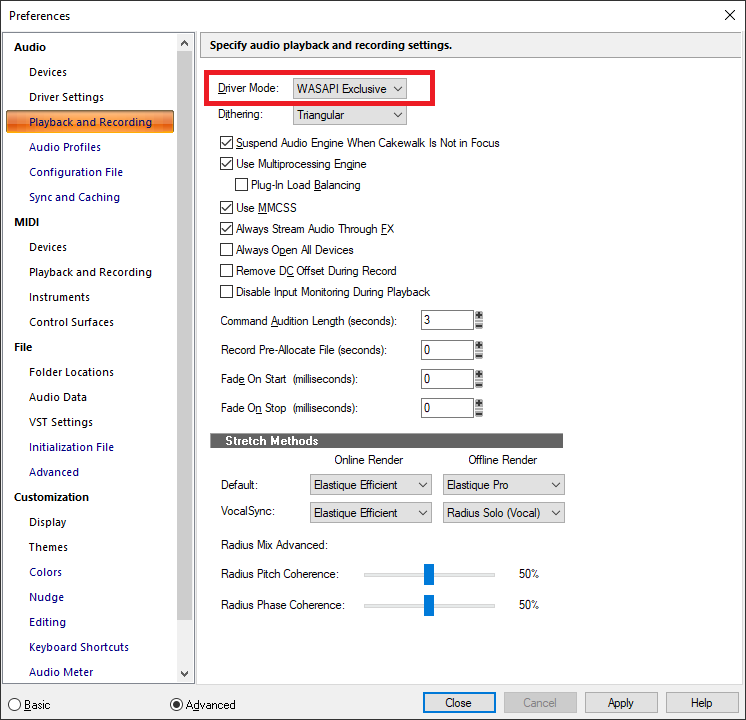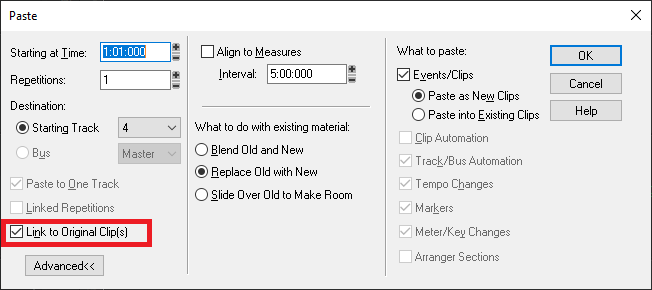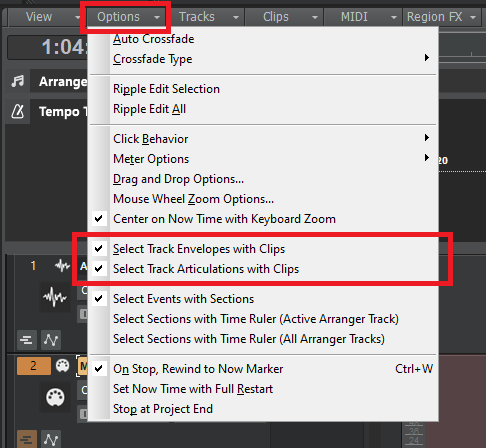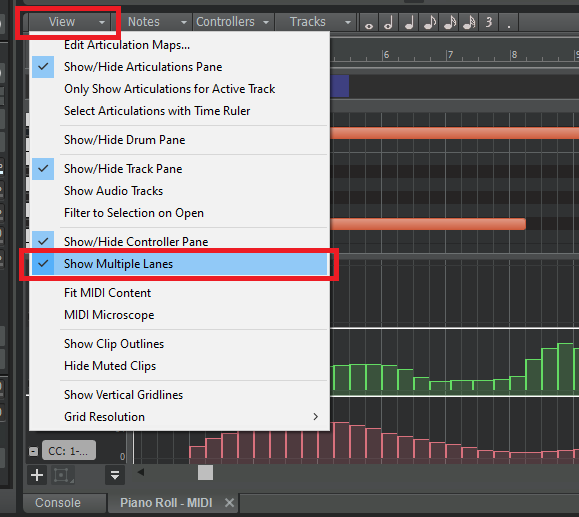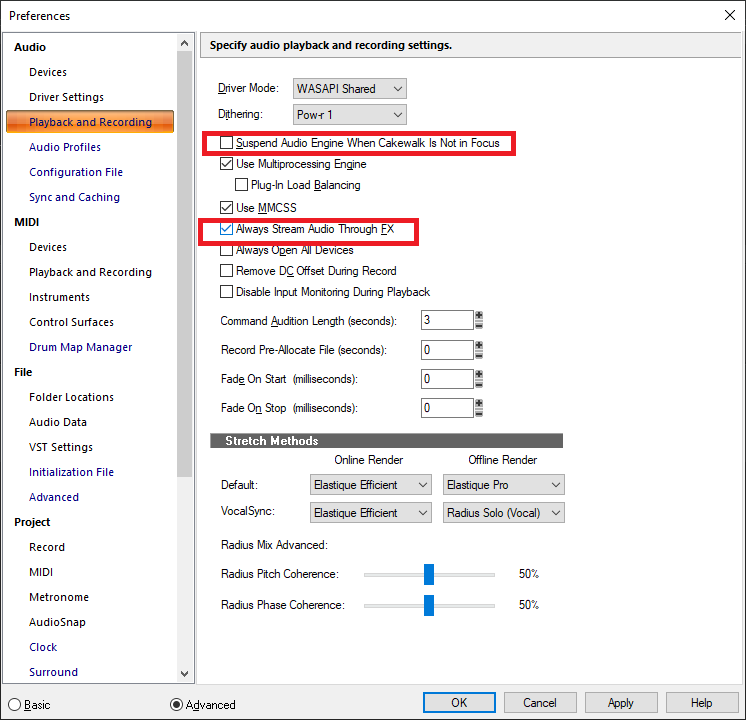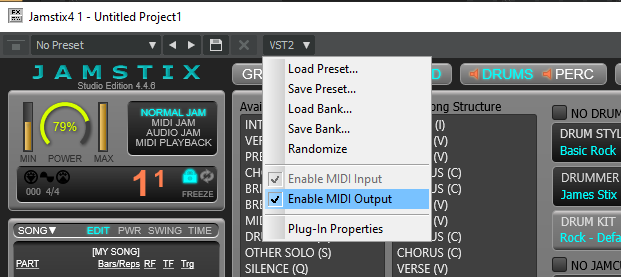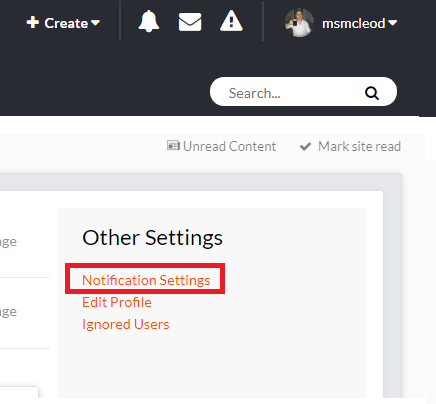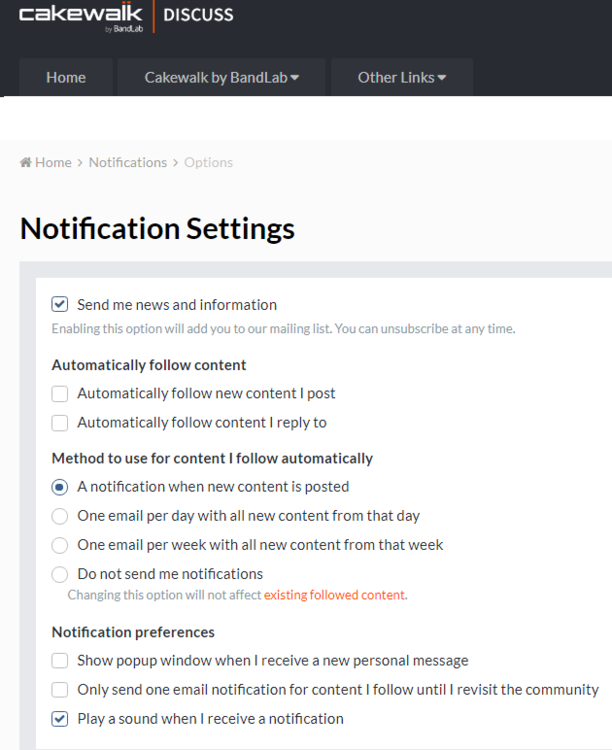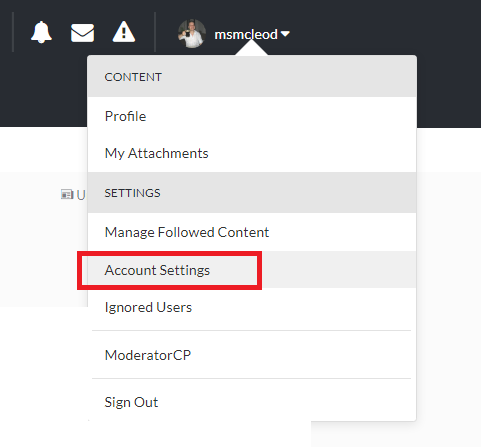-
Posts
7,120 -
Joined
-
Last visited
-
Days Won
39
Everything posted by msmcleod
-
If you're both using Cakewalk, the easiest way is to zip up your project directory and either use a cloud drive for sharing the file, or just email it. If you're both using separate DAWs, there are various ways: Export as OMF (assuming the other DAW supports this) Export the tracks as Audio Upload the project to BandLab
-
Try this: 1. Go to Preferences ->Keyboard Shortcuts and bind a key to "Dock in Multidock" (use something like the " / " key ) 2. Views->Piano Roll View 3. Press the key you've just bound
-
Bear in mind that currently most A/D converters only have a resolution of about 20 bits... they use oversampling to extend to 24 bits, but I doubt if you'll hear any improvement in quality going to 32 bit. All you'll get by recording at 32bit is a bigger file. To be honest, the only reason to have 32 bit or 64 bit files is if you're using an external audio editor, and you want them to use the extended dynamic range (although I guess in theory, Melodyne does come in to this category). You might get better quality going to 96Khz though. BTW - you mentioned 64bit Double Precision Engine setting earlier in the thread... this has nothing to do with the bit size of your audio data. It only applies to the internal processing of audio data within Cakewalk's audio engine. In essence, it preserves more of the dynamic range when mixing a large number of tracks.
-

Can't even start app. All other sequencers work fine
msmcleod replied to David Govett's topic in Cakewalk by BandLab
@David Govett - before you open a project, can go to Edit->Preferences, then post a screenshot of the MIDI->Devices page ( ALT + PrtSc will take a screenshot of this dialog when it's open). [Edit] - if you could also do the same for the "Playback and Recording" and "Control Surfaces" pages, that might help us to narrow this down. Thanks. -
Can you clarify: 1. Are you using bitbridge with Melda Plugins? 2. Are you referring to Antares Autotune, and in which case are you using 64 bit or 32 bit and VST3 or VST2 ? There is no reason to use bitbridge for Melda plugins. Melda does 64 bit versions of all their plugins, so you should be using them. With regards to Antares Autotune, you should the VST2 version as there are known issues with all Antares VST3 plugins.
-
I had this issue using ASIO with an on-board Realtek device - switching to WASAPI fixed the issues for me:
-
I normally use the Channel Tools plugin for that. If you want to permanently swap them, use Process Effect:
- 1 reply
-
- 3
-

-
Actually SONAR Platinum did have to re-authenticate every 6 months. I rarely use SONAR nowadays, but occasionally fire it up to compare behaviour to see if a bug has been recently introduced or was already existing in SONAR. I fired it up only last week and got the "Needs Authorization" popup. Once I'd logged into Cakewalk Command Center, it re-authorized and I was good to go again.
-
This is how it's currently done:
-
If you've not used per-output tracks with Kontakt before, check this out: You can add a new instrument to Kontakt at any time, but make sure you either re-run the batch function after adding it within Kontakt to create a new audio output for it, or manually create one yourself. As long as you've not re-ordered your Kontakt instruments in any way since adding your per-output tracks (i.e. you're always just adding a new instrument to the bottom of the list), you can just use the "Clear output section and create one individual channel for each loaded instrument" function. This will blow all the existing audio outputs away, and create new ones based on the instrument order. Don't do this if you've changed any MIDI or Audio outputs for any of your existing Kontakt instruments, or if you've created Aux/FX channels inside Kontakt itself though... else you could get a mismatch between your Cakewalk tracks and your Kontakt instruments. If you have re-ordered / changed MIDI/audio outputs for any existing Kontakt instruments, or you've added Aux or FX outputs within Kontakt itself, select: "Split instruments routed to first output channel to individual outputs" to create the additional audio outputs for only the new tracks you've added, then select "Rename output section channels according to assigned instruments" to give them a sensible name in Cakewalk. Once you've done that, you can close the Kontakt plugin UI, right click on an existing Kontakt track and select "Append Instrument Track" - it'll automatically add a track assigned to the newly added instrument (repeat this for as many instruments you added within Kontakt). CbB has no way of peeking inside Kontakt to see how you've assigned things , so when using per-output instrument tracks, Cakewalk assumes that you've set up separate and incrementing MIDI channel / Audio outputs for each instrument ( i.e. MIDI Ch 1 = Audio Ch 1, MIDI Ch 2 = Audio Ch 2, etc ). So in general, I would advise against changing MIDI / Audio outputs for your Kontakt instruments to anything other than this when using per output tracks. If you're stacking MIDI parts, it's much easier to use linked clips - if you've not used them, it basically means that the copies and the originals are always kept in sync. Editing any one of them will replicate the change in all the other clips linked to it. To copy/paste as a linked clip, use CTRL+C to copy, then CTRL+ALT+V to paste (Paste Special) making sure "Link to Original Clip(s)" is checked: You can manually change your Kontakt MIDI / Audio channels by hand, but it can be a pain keeping the Kontakt Audio/MIDI channels in sync with the Cakewalk tracks. This normally involves splitting the instrument tracks in Cakewalk, fixing up the MIDI / Audio outputs, then re-making them into instrument tracks again.
-
MeldaProduction gets my #1 vote on all counts. Free upgrades for life and past purchases count towards a discount on bundles. Waves have excellent support, not only from a customer point of view, but also their development team are extremely engaged with DAW manufacturers. Not a huge fan of their upgrade policy though. Native Instruments have a pretty fair upgrade policy IMO. Not had much experience with their support, so can't comment. Once thing I would say about subscriptions vs buying outright. Subscriptions make total sense from a tax point of view if you're doing recording/composing/mixing as a business. Buying outright can make more sense for non-business users depending on the cost. It annoys me when companies that use iLok and only offer one activation. IMO they should provide at least two if not three. I appreciate this might drive the cost up, but then it'd still be cheaper than buying the plugin three times.
-
When recording guitar, I normally record the stereo output of my effects processor (VG-88), and also the dry guitar signal. 95% of the time, I'll just use the stereo signal I recorded, but occasionally I'll use the dry signal and reamp. What I would say though, is that in many ways a mono guitar is much easier to mix - especially when you're starting out. You can add reverb / chorus, or double track to make it stereo later. For drums, I've had success with anything from one mic to 12 mics. The more mics, the more control you have. Also, with less mics it's more important that the drummer can play with a balanced sound as you're ability to balance the individual drums is reduced. In the days where I only had a 4 or 8 track recorder, I used to run the mics into a mixer and record the drums as a stereo pair... not ideal, but it did give me a bit more control over balance. In saying that, it can definitely be done - pay attention to the techniques he uses for the overheads with regard to distance from the snare. Regardless of how you're recording drums, make sure you get several recordings of each drum on its own once you've mic'd up the whole kit. You can cut/paste these as samples on separate track and mix them in on a case by case basis should you need to change the level after the fact, or you find you've got too much bleed in a particular area.
-

MIDI to step sequencer conversion - Incosistent
msmcleod replied to Todd Groemling's topic in Feedback Loop
If anything else other than the MIDI clip is in your selection, the menu item will be greyed out. Maybe you've got Track Envelopes selected too? Try unchecking these two before selecting your clip:- 2 replies
-
- 1
-

-
- inconsistent
- workflow
-
(and 2 more)
Tagged with:
-

Sliding Function -is there a Slide Special?
msmcleod replied to Michael Fogarty's topic in Cakewalk by BandLab
Personally I find "Project->Insert Time/Measures" more useful for inserting a space within the project - especially when markers, tempos & meter/key changes are involved. For deleting space with markers/tempos/meter/key, I normally create a temporary arranger section and switch Ripple Edit on before deleting it, as arranger operations always include everything when they're selected with events. Just be careful of your "Arranger Section Event Overlap Threshold"... if in doubt, switch that to "Off". -

Questions about the piano roll controller
msmcleod replied to MoShuang's topic in Cakewalk by BandLab
-

Audio file causes popping when opening Cakewalk Project
msmcleod replied to Leepster's topic in Cakewalk by BandLab
Two things come to mind, 1. A plugin on your master bus may be causing this - try bypassing FX before adding the audio track (either by pressing the "FX" button in the control bar, or just bypassing the FX bin on your master bus). If this solves it, then you can narrow it down by enabling the plugins one by one until you reproduce it. 2. Cakewalk is stopping/starting the audio engine. Some drivers create a popping noise when the driver is initialized. Making sure "Always Stream Audio Through FX" is checked, and "Suspend Audio Engine When Cakewalk is Not in Focus" is unchecked should ensure Cakewalk keeps the engine running: -
Found this on the Ardour forum, by one of their developers: https://discourse.ardour.org/t/aaf/87442/2 Most interesting, is the comment from one of the AATranslator developers (which certainly echoes my experience): https://discourse.ardour.org/t/aaf/87442/8 Pay particular attention to his comment about the fact that every application (whether DAW or NLE) has chosen to interpret the "standard" in their own way, so there's no guarantee that an AAF format will load properly in another application - even from the same vendor it seems! If you look at the features of OMF & AAF they're almost identical with respect to Pro Audio. The notable exception being Video Cue Marker support. I had another play with AAF yesterday - it doesn't even support stereo WAV files. You not only have to separate them into L & R channels, the WAV files themselves have to be deconstructed and the data & headers stored in different places. To make things worse, the example code they supply to do this is full of bugs and only supports a very narrow set of WAV files. To say I was shocked was an understatement. To top it off, you need to use Visual Studio 2012 to build everything as it won't support VS2013, VS2015, VS2017 or VS2019 (which meant digging out one of my old laptops).
-
It should be easy to create your own - here's me doing it using the UI for the Yamaha P-200:
-
Disable the MIDI output of your drum VSTi: Or alternatively set the MIDI input filter on your recording MIDI track to "All External Inputs"
-

[SOLVED] Can't hear my bass guitar well when recording.
msmcleod replied to tdehan's topic in Cakewalk by BandLab
@tdehan - you can configure your notification settings within your account settings. First click on the dropdown where your username is on the top left: This will take you to your account settings page. Click on Notification settings: You can now adjust your notification settings: You can also opt-in to follow a particular topic by clicking on the Follow link to the left of the topic header: -
These guys have been around since 1994. I tried out a trial version of their software as I was considering applying for a job there at one point. It's pretty good: https://www.earmaster.com/
-
Not if all the individual instruments are all listening on the same MIDI channel... unless of course, you use assign a different controller for volume within Kontakt for each instrument. To be honest, I would actually go about this a different way. I would create per-output instrument tracks for a single Kontakt instance then copy the MIDI clip as a linked clip to the other tracks. This gives you two advantages: 1. Each track has its own (audio) volume automation, and its own effects bin. 2. By using linked clips, you only need to edit one of them and the rest automatically get updated. Audio volume automation has a much finer granularity than MIDI automation too, so your far less likely to get a "stepped" effect when automating your volume. However if you really do just want a single track, another way of doing this would be: 1. Create four per output instrument tracks for each of the instruments 2. Copy the MIDI clip to the other 3 tracks as linked clips 3. Hide tracks 2,3 & 4. You could then use MIDI volume automation for channels 1,2,3 & 4 on the first track. OR another way: 1. Keep the track you have now. 2. Create 3 other MIDI tracks, assigning the output channels to 2,3 & 4 and copy the MIDI clip as a linked clip to those tracks 3. Hide the 3 tracks. 4. In Kontakt, change the MIDI input for instruments 2,3 & 4 to channels 2, 3 & 4. 5. Use MIDI volume automation for channels 1,2,3 & 4 on the first track.
-

Is there a simple way to even out vocal signal
msmcleod replied to RICHARD HUTCHINS's topic in Cakewalk by BandLab
To be clear, what Craig and I do is slightly more than normalize them... what we do is split the clips at each phrase, then normalize or clip-gain adjust them individually. So each individual phrase is normalized against itself, not the whole vocal track. Although in saying that, I tend to reach for Vocal Rider or MAutoVolume far more often now, even if it means applying that effect, then doing the tweaking afterwards using clip gain automation, as it saves a lot more time. -

feature request Groove Clip Looping Feature request :)
msmcleod replied to Ez Goen's topic in Feedback Loop
Isn't that almost the same as just setting the clip length in the clip properties?



